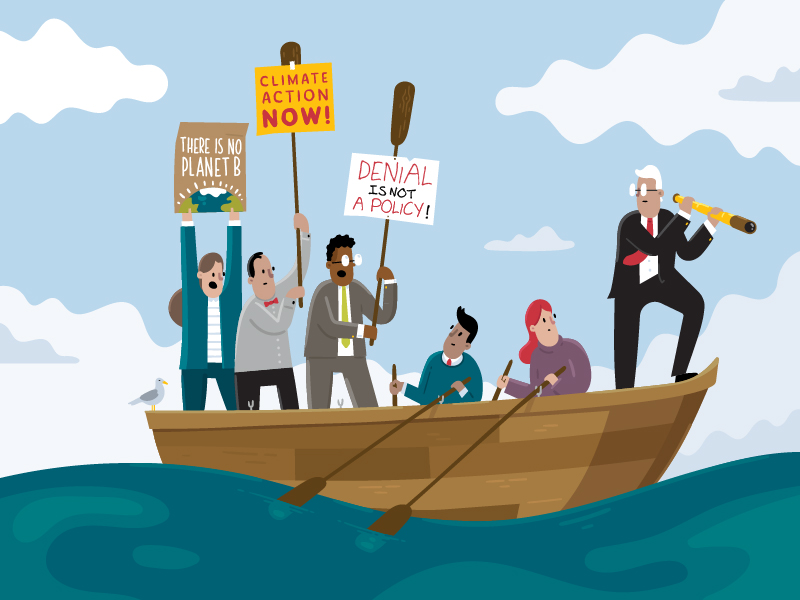Whether or not regulations aimed at mitigating climate change are implemented, United States corporations already face legal ramifications for not addressing climate change.
Pressure from investors, in the form of lawsuits and shareholder proposals, has the potential to remake the legal landscape and force companies to disclose and address climate risks.
“We’ve seen top-down measures proposed that would have required certain public companies to disclose climate impacts and risks, but don’t necessarily expect those to stick,” said Lindsay Sain Jones, assistant professor of legal studies. “Given that, we looked at what options frustrated investors have to drive change as well as the viability of those options in light of developments in recent years and months. Since companies have been focused on lobbying against these new regulations, investor-driven efforts may have been overlooked.”
The University of California Davis Law Review recently accepted for publication Jones’s legal analysis of actions corporations could face from activist shareholders in Investor Driven Climate Accountability. The paper won the Nancy Kubasek Sustainable Environment Award from the Academy of Legal Studies in Business.
Jones and coauthor Kimberly Houser detail three types of actions corporations need to be aware of as they plan responses to climate change and offer broad advice for minimizing liability.
The first and rarest are risks from lawsuits brought under the Securities Exchange Act of 1934. The law requires corporations to disclose information that may be “material” to shareholders and has traditionally meant companies must disclose material financial factors and the impact of external factors (new regulations or natural disasters).
“These are lawsuits that allege the company either misrepresented something material to the shareholders or omitted something material, and misrepresentation or omission has resulted in an economic loss,” Jones said.
“In the past, companies have been able to argue that environmental impacts were not material to a reasonable investor. We’re saying that with the increased emphasis on climate change by regulators and with climate-related losses climbing each year, climate-related reporting is becoming material to more investors.”
The second set of lawsuits brought by shareholders accuse board members and directors of breaching their fiduciary duties to shareholders by failing to monitor and respond to climate change related risks, Jones said. Specifically, they are sued for violating their duty of loyalty, which requires directors to place the interests of the shareholders before their personal interests.
In recent years, courts have shown an increased willingness to scrutinize board oversight as a component of its duty of loyalty to the corporation, Jones said. This type of suit puts board members at personal risk since, under Delaware law, a company cannot exculpate directors from personal liability for breaching their duty of loyalty.
“If they are not monitoring certain risks they can be sued, and they can’t be indemnified by the corporation, so there is personal liability for the board,” Jones said. “There’s been a series of cases where the Delaware courts have entertained claims against directors for lack of oversight.”
These cases are most likely to be brought against board members at companies with the greatest risk of climate-fueled loss — property insurance, energy and agricultural and natural resource companies.
“The key words they’re using in these cases is a lack of oversight of ‘mission critical risks,’” Jones said. “If they’re not monitoring and reporting to the board on mission-critical risks, then they can be subject to personal liability.”
The list of companies for which climate risks are considered “mission critical” is likely to expand with the continued focus on climate change by regulators, as legal compliance is always mission critical, Jones said.
The type of action businesspeople report having the most concern over are shareholder proposals, Jones said. These range from demands for more climate or environmental impact reporting to demanding the ouster of board members not willing to discuss climate impacts.
“When I ask attorneys who regularly represent corporations in shareholder litigation what their clients are actually nervous about, they say shareholder proposals,” she said. “There has been an increase in the number of climate-related proposals, where the shareholders say, ‘We want greenhouse gas emissions disclosures. We want to know the climate-related risks. We want to know what our climate impacts are.’”
In 2021, the Securities and Exchange Commission expanded the types of shareholder proposals companies had to include in shareholder votes. In 2022, more than 800 shareholder proposals were filed, with the largest category of these about environmental impacts.
The new SEC regulations, combined with activist stances taken by BlackRock, Vanguard and State Street, made the threat of reform through shareholder proposals more realistic.
“You may have just one activist shareholder, just that guy in the back who’s concerned — but if you get a big institutional investor behind him, then you might actually have some ability to make some change,” Jones said.
The most notable of these happened at Exxon in 2021. An activist shareholder — the small hedge fund Engine No. 1 — owned .02% of the shares of Exxon but got the support of BlackRock, Vanguard and State Street. They forced the ouster of three members of Exxon’s 12-member board and replaced them with people more supportive of climate action.
With this changing landscape, Jones and Houser recommend corporations: ensure their governance structure requires board members and executives to protect the corporation from long- and short-term climate risks; disclose climate risks, impacts, and discuss plans to reduce them.
“What we would recommend from a risk management standpoint is implementing governance aligned with climate change risks — reporting to the board, monitoring climate risks and even having someone on the board charged with climate-related responsibilities,” she said. “Also, live up to any pledges you make. If you’re going to say you’re reducing greenhouse gases by some percent by 2050, do that. Otherwise, you risk reputational harm as well as shareholder action in the form of lawsuits or proposals.”

